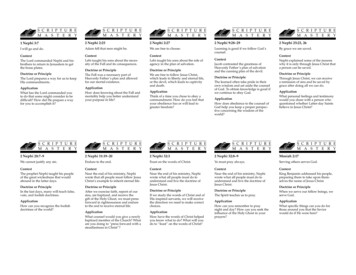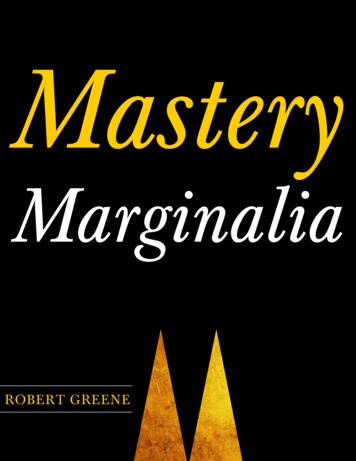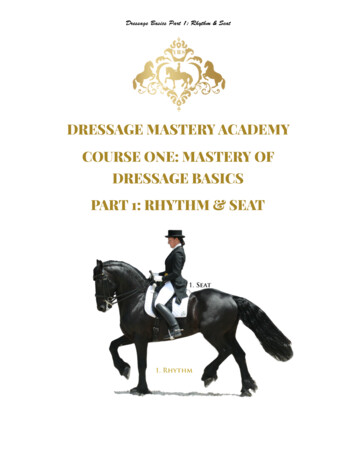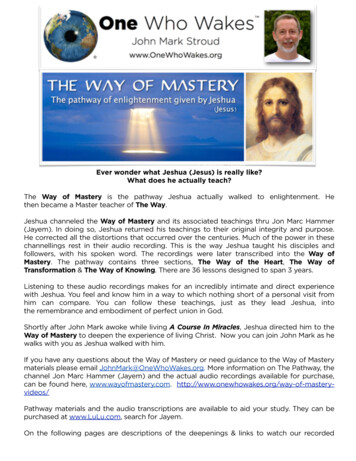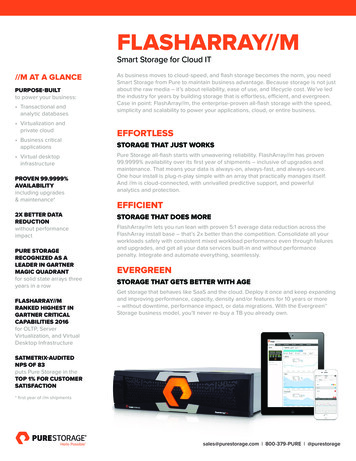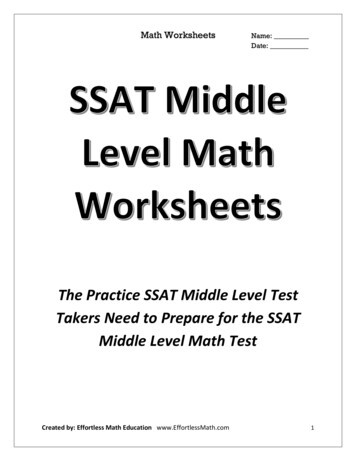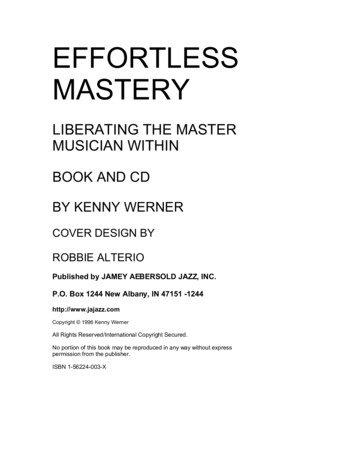
Transcription
EFFORTLESSMASTERYLIBERATING THE MASTERMUSICIAN WITHINBOOK AND CDBY KENNY WERNERCOVER DESIGN BYROBBIE ALTERIOPublished by JAMEY AEBERSOLD JAZZ, INC.P.O. Box 1244 New Albany, IN 47151 -1244http://www.jajazz.comCopyright 1996 Kenny WernerAll Rights Reserved/International Copyright Secured.No portion of this book may be reproduced in any way without expresspermission from the publisher.ISBN 1-56224-003-X
Effortless MasteryDedicationFor my father, who said that he loved to give advice and alwayswanted to write a book entitled If I Were You!For my mother, who exemplifies selfless service and never offeredme anything but encouragement.For my beautiful daughter Katheryn may her brashness never bethwarted.For my wife Lorraine, who has taught me the meaning of Dharma, orrighteous action one of the most soulful and selfless people I’ve evermet. We’re all lucky to have her!AcknowledgementsI would like to thank the following people and institutions forhelping make this book a reality:Robin Brisker, for helping me figure out the earlyversion of the cover design; Scott Reeves, for an earlyediting of the text; and Tony Moreno, forgiving me muchsource material which I used extensively - all done as alabor of love.The Danish Musician’s Union and Jens Sondergaard,for inviting me to give a very special clinic on a”sunny day” in Copenhagen. The original text was anunedited transcription of my two days there.Winnie and Eigil Mollsgaard, for allowing us to use their beautifulhome for the clinic.All the music societies and universities that invited me to givelectures and perfect my ”schtick.”Jamey Aebersold, for immediately sharingmy enthusiasm for this project, and for his owndedication to spirit.
Effortless MasteryFor my beloved teacher,Gurumayi Chidvilasananda,for continually leading me along thepath towards the heart and reminding meabout ”the inner music.”
Effortless MasterySelected DiscographyAs LEADER:Ken Werner Plays the Music of Bix Beiderbecke. Duke Ellington. James P. Johnson andGeorge Gershwin: (Finnadar Records)Beyond the Forest of Mirkwood: Ken Werner (Enja Records)298 Bridge St.: Ken Werner Sextet - Joe Lovano, Bill Drewes, Bill DeArango, RatzoHarris, torn Rainey (AMF Records)Kenny Werner: Introducing the Trio: Ken Werner Trio - Ratzo Harris, torn Rainey(Sunnyside Records)Uncovered Heart: Ken Werner Sextet - Joe Lovano, Randy Brecker, Eddie Gomez,John Riley, Edson Cafe Adasilva (Sunnyside Records)Press Enter: Ken Werner Trio - Ratzo Harris, torn Rainey (Sunnyside Records)Meditations: Ken Werner (Steeplechase Records)* Copenhagen Calypso: solo(SteepleChase Records) Gu-Ru: Ken Werner Trio - Ratzo Harris, torn Rainey (TCBRecords)Paintings: Ken Werner, torn Rainey, Ratzo Harris, Billy Drewes, Tim Hagans, MarkFeldman, Eric Friedlander, Cafe Edson Adasilva, Jamie Haddad, Judith Silvano, RichardMartinez (Pioneer LDC, Inc., Japan)Kenny Werner Live at Maybeck Hall: Chris Potter and Ken Werner (Concorde Records)Kenny Werner Trio Live At Visiones: torn Rainey, Ratzo Harris (Concorde Records)A Delicate Balance: Ken Werner Trio featuring Dave Holland and Jack DeJohnette(RCA/BMG)As SIDEMAN:Something Like A Bird: Charles Mingus (Atlantic Records)I Know About the Life: Archie Shepp (SteepleChase Records)Comin’ and Goin’: Jim Pepper (Europa Records)Soul Song: Archie Shepp (Enja Records)Tangents: Chico Freeman (Elektra-Asylum Records)Twenty Years at the Village Vanguard: Mel Lewis Jazz Orchestra (Atlantic Records)Tones, Shapes, and Colors: Joe Lovano (Soul Note Records)
Transition: Peter Erskine (Denon Records)The Good Life: Archie Shepp (Varrick Records)
Effortless MasterySoft Lights and Hot Music: Mel Lewis Jazz Orchestra (Music Masters Records)To You: Mel Lewis Jazz Orchestra (Music Masters Records)Definitive Thad Jones: Mel Lewis Jazz Orchestra (Music Masters Records)Definitive Thad Jones. Volume 2: Mel Lewis Jazz Orchestra (Music Masters Records)Lost Art: Mel Lewis Sextet (Music Masters Records)Confidential: Special EFX (GRP Records)Street Talk: Eddie Gomez (Columbia Records)Music Inside: Joyce (Verve Forecast Records)Landmarks: Joe Lovano (Blue Note Records)Sweet Soul: Peter Erskine (BMG)Language & Love: Joyce (Verve Forecast Records)Reaching For the Moon: Roseanne Vitro (CMG)Global Village: Special EFX (GRP Records)Sail Away: torn Harrell (Musidisc Records)Zounds: Lee Konitz (Soul Note Records)Universal Language: Joe Lovano (Blue Note Records)Labyrinth: torn Harrell (RCA/BMG)Celebrating Sinatra: Joe Lovano (Blue Note Records)Between Heaven and Earth: Andy Stattman (Shanachie Records)Betty Buckley: Children Will Listen (Sterling Records)- With One Look (Sterling Records)- The London Concert (Sterling Records)- Live At Carnegie Hall (Sterling Records)- Much More (Sterling Records)”Channeling Music.” Organica, Spring 1988
”Play for the Right Reasons.” Organica. Winter 1990”Hostile Triads.” The Piano Stylist & Jazz Workshop. April-May 1991
Effortless MasteryHow To Use The CDThe exercises on the CD are basically meditations/ visualizations. Theirpurpose is to help you experience your ”inner space.” This is a statediscussed in great detail throughout the book. The meditations are alsofeatured as chapters in this book. When you reach those chapters, you willbe instructed to listen to the corresponding exercise on the CD. Part of theireffect is to relax and focus you after you have absorbed a great deal ofinformation, and to give you a sense of the consciousness being described.If you listen to the meditations consecutively, they may sound repetitious asthey contain much overlapping information. If used when indicated,however, they can enhance the experience of this book greatly.I recommend that you carefully read the meditations presented in thechapters, as well as listening to them on the CD. In some cases, there area few ideas in the chapters that are not mentioned on the CD.After you have experienced the exercises the first time in their intendedplaces, feel free to use any or all of them as an ongoing practice forcontacting, working with and creating from that ”inner space.”Some of the material in this book is specifically directed towardsmusicians and may seem highly technical, especially some of theexamples in the chapter, ”Step Four.” Please feel free to pass over thosepassages. The bulk of the text should relate to anyone who aims to attainmastery in any area of their lives.
Effortless MasteryTable of ContentsPreface 91 Introduction 132 My Story 153 Why Do We Play? 274 Beyond Limited Goals 375 Fear, The Mind And The Ego 516 Fear-Based Practicing 597 Teaching Dysfunctions:Fear-Based Teaching 658 Hearing Dysfunctions:Fear-Based Listening 699 Fear-Based Composing 7310 ”The Space” 7711 ”There Are No Wrong Notes” 8712 Meditation #1 9313 Effortless Mastery 9914 Meditation #2 11915 Affirmations 12516 The Steps To Change 13117 Step One 13518 Step Two 145
19 Step Three 15120 Step Four 15921 An Afterthought 17322 I Am Great, I Am A Master 17923 Stretching The Form 18324 The Spiritual (Reprise) 187One Final Meditation 191
Effortless MasteryEffortless MasteryTRUTH: INNOVATION VS JAZZ!Louis Armstrong, Duke Ellington, Bix Biederbecke,Fats Waller, James P. Johnson, Jelly Roll Morton,Scott Joplin, Charlie Parker, Dizzy Gillespie, Miles Davis,Bud Powell, Bill Evans, Ornette Coleman,Thelonious Monk, John Coltrane. Can we agree that this is a fair representationof the tradition of jazz? What do these people all have in common?THEY WERE ALL INNOVATORS!INNOVATION IS THE TRADITION
Effortless MasteryPreface(The realm of the gifted has always seemed to be an exclusive club. Thecommon belief is that, ”Some of us have it, some of us don’t.” Implicit inthat statement is the assumption that ”most of us don’t.” The way music(and, I suspect other subjects as well) is traditionally taught works for thosewho ”have it.” Only very gifted or advanced students absorb the languageof music in the way it is usually taught. Perhaps two percent of all musicstudents ever attain anything. Many others struggle with the variouselements of playing or improvising and as a result do not becomeperformers.Most people fall by the wayside. We don’t seem to have given muchthought to this discrepancy, simply accepting the old adage, ”some of ushave it and some of us don’t.” In cultures less intruded upon by”civilization,” everyone is a musician. It has much to do with how music isintroduced into our lives. This book will look at that subject and offer hopeas well as practices to those who think they ”don’t have it.” These practiceswill also increase the effectiveness of those who believe they do.My belief is that, if you can talk, you can play. There are many reasons whythe so-called less gifted don’t get it. There are also methods of obtaining”it,” which this book will discuss.Many people have what I call musiphobia: fear of playing music. To aperson afflicted with musiphobia, touching an instrument is like touching ahot stove. This is irrational, since one cannot get burned touching aninstrument-yet it is a common problem. Though there are absolutely nonegative consequences, most of us are afraid. It is not our fault. We havebeen programmed to fear playing. All too often, our relationship to music isdoomed to failure.
Effortless MasteryA person might give up playing for reasons of insufficient talent, when uponcloser inspection it becomes clear that the problem was the mode of study, orthe lack thereof.Many people are crippled by an inability to focus and by a sense of beingoverwhelmed. These problems are often mistaken for laziness or lethargy. Thereis a grand paradox in why we can’t focus. This subject will be explored and manyother paradoxes as well.The exercises will help people on different levels in different ways. For example,there are good players who, for some reason, have little impact when they play.Everything works fine. They are ”swinging” and all that, but still, something is notlanding in the hearts of their audience. They are trapped in their minds. There isno nectar, because they are merely plotting and planning an approach alongacceptable, ”valid” lines of jazz style. The same thing commonly occurs toclassical performers. They don’t know what ”channeling creativity” is becausethey, too, are dominated by their conscious minds. One must practicesurrendering control to a larger, or higher force. It’s scary at first, but eventuallyliberating. In Sanskrit the word is moksha, which means liberation. Moksha isattainable through the surrender of the small self to the larger ”Self.” I willintroduce exercises for achieving that goal in music. After one taste of mokshathrough the medium of music, one will never want to return to a life of ”thinkingmusic.” As one moves beyond the acceptable to the inevitable, creativity flows.Personal power will increase manyfold.One truth for all players to contemplate is this: learning new kinds ofsophisticated jazz theory is not necessarily the key to freedom. Once new theoryis mastered, it is recited with the same dreary predictability as the old. If you areinhibited playing with the toys you have now, you will not play differently with newtoys. Also, many jazz players feel that there is an experience in improvisationthat they are not having, or not having fully enough. Classical musicians alsoreport a ”dryness” in their renderings of the great composers. It’s like the priestwho secretly has no love for God. The customs are observed, but there is no10
Effortless Masterytrue feeling. If the lamp is not lit, music can be as dreary as anything else.Along with the desire for a deeper experience comes an intense drive to bea better player. These aspects often work against each other. True musicaldepth is not about better playing, but about more ”organic” playing.It’s very hard to let go in the combat of performance, but the exercises herewill help you expand your ”intuitive self.” Over time, this intuition willemerge naturally without sabotaging the technical part of yourperformance. Assimilation into the whole is very much about ”forgetting”one’s self.People who meditate or do tai chi will recognize many of the principles inthis text. Even to them, it may be a revelation to know that one can live inthe meditative state while playing an instrument. The mind is the chiefculprit in most playing problems, and so any discipline that aims to controlthe mind is complementary to the process described here. Music can shootthrough the musician like lightning through the sky if that music isunobstructed by thoughts. Therefore, the elimination of thoughts is a veryrelevant issue.To dysfunctional learners, of which there are many in the jazz educationalsystem, these exercises will cut through loads of books and exercises. Itwill help them get in touch with the next step in their development, puttingaside all the theories, politics and fashions and instead focusing on theirlives and the personal meaning that music has for them. In many cases,the decision to study music has robbed them of the ability to play music.They have lost respect for music that comes from within because they havebeen programmed to feel ”unworthy.” Some parts of this book will helpthese individuals get back to loving and honoring themselves, with orwithout music! Even many great professionals suffer from low self esteemand other negative illusions.For those who practice things that never surface in their playing, (and thereare many such musicians), I offer reasons for why this happens, as well asa way out of this dilemma. This book also contemplates the relationship ofbelief systems to11
Effortless Masteryeffectiveness and how we ”practice for mediocrity.”In addition this book delves into the nature of artistry, and quite extensivelyinto the nature of mastery. I will discuss how to effortlessly play what youalready know and reach a depth you didn’t think you were capable of.There are certainly artists who can enjoy music in a positive way, artistswho always know how to become inspired and how to execute effortlessly.But the percentage of people who do this is small. Much of this book is forthose who are not succeeding in their efforts to fulfill their hopes anddreams musically, and for musicians who feel tense and constricted whileplaying. Some of the ideas contained here are radical. They challengeinstitutions to change and individuals to move from the comfort zone oflimitation and blossom into their higher selves. If you’ve been playing forthirty years and hardly ever enjoyed it, if you’ve constantly pointed to otherplayers and thought that they possessed something you didn’t, or if you’vepracticed for years and never really improved, read on.12
Effortless MasteryChapter 1Introduction (There is an ocean. It is an ocean of consciousness, an ocean of bliss.Each one of us is a drop in that ocean. In that sense, we are all one or asa famous American television commercial states, ”We’re all connected.”Illusion would have us think that we are all separate entities, separatedrops. But if that were true, we would all evaporate rather quickly.As we expand our limited selves into this infinite consciousness, we tapinto a network of infinite possibilities, infinite creativity great, great power.Carried by the waves of this ocean, we swirl past all limitations andmaximize our Godgiven potential. Everything good that can possiblyhappen to us, from within and without, does. Our abilities expand beyondall reasonable limits, and we become a magnetic force for abundant lightand all that that implies.We are all part of a universal game. Returning to our essence while livingin the world is the object of the game. The earth is the game board, and weare the pieces on the board. We move around and around until weremember who we really are, and then we can be taken off the board. Atthat point, we are no longer the game-piece, but the player; we’ve won thegame.As musicians/healers, it is our destiny to conduct an inward search, and todocument it with our music so that others may benefit. As they listen to themusic coming through us, they too are inspired to look within. Light is beingtransmitted and received from soul to soul. Gradually, the planet movesfrom darkness to light. We as musicians must surrender to the ocean of ourinner selves. We must descend deep into that ocean while the sludge ofthe ego floats on the surface. We let go of our egos and permit the musicto come through us and do its work. We act as the instruments for thatwork.13
Effortless MasteryIf we can live in this realization, we will constantly have deep motivation forwhat is played, never getting stuck in the ungrateful consciousness of goodgigs/bad gigs, out-of-tune pianos, low fees, ungracious audiences, and soon. Instead, our minds will be consumed with what a very great privilege itis to be the one selected to deliver the message to others. We will nolonger be caught in the mundane world of good music/bad music (”am Iplaying well?”) Instead, our hearts and minds will be focused on the task ofremaining empty and alert to receiving this God-inspired information andtranslating it faithfully, without any coloration from us.14
Effortless MasteryChapter 2My StoryNumb in Long IslandI grew up in a cultural wasteland. I’m sure that people from the suburbs allacross America can identify. Post-World War II America had witnessed”miraculous” innovations, such as television, drug-induced labor and TVdinners. The baby boom was such that hospitals came to rely on drugs tohurry along the process of birth; no time for mom to get too comfy.Machines monitored expectant mothers. Caesarean births increasedgreatly. Drugs and intrusive hospital procedures - such as treating themothers-to-be as if they were sick - severed the time-honored process ofmother-child bonding. If Mary had given birth to Jesus in 1950, all thoseMadonna pictures would have shown her groggy from drugs with an insertof Jesus under a heat lamp next to twenty-five babies!This time period produced ”amazing discoveries.” Cans and boxes werecreated to preserve food: just heat and serve. Researchers found ways ofadding vitamins and minerals to create a ”superior product.” Fortune smiledon our civilization, and flavor-enhancers were born! I ate canned peachespacked in delicious sugar gravy for about fifteen years before actuallyeating a fresh peach. What a disappointment that was! Fresh peachestasted like lemon-flavored suede shoes! Nothing could match the ecstasyof drinking the juice from canned peaches or pears.Most of the kids I knew ate dinner the same way; we took our plates fromour moms and went to the den to eat alone while watching television. Inthat way, we could remain blissfully shut down. Television short-circuitedour minds, and the salt and sugar in all the food kept our senses occupied.By eating alone,15
Effortless Masterywe didn’t have to converse or answer questions. There was enoughdistasteful stuff of that kind in school.I’m waiting for new, startling evidence to turn up, showing that the Greeksand Romans had a crude form of television before their downfall.Television and its programming contributes more to the dehumanization ofsociety than any other development in history. It seems that the successfulstrategy in the market place is to keep us hungry, horny, and as unfocusedas possible. Mindmelding with TV robs us of an inner connection andmakes living in the moment intolerable. TV is a drug, and we as a nationhave become hooked. It isn’t hard to see why the baby-boomers pursuedtheir drugs so vigorously. Turn on Saturday morning TV for kids and watchan ad for cereal! Beams of light come streaming out of the box, and whenthe cereal is consumed, the child becomes encircled in golden honey lightand then blasts off for Venus! Jimi Hendrix and Janis Joplin died trying tofeel that good!School was a place where we were all supposed to develop our minds andlearn social interaction. Whatever personal interests we were developingdissolved in an ocean of useless information. Since the relevant wasindistinguishable from the irrelevant, it was hard to develop a genuineaffinity for things we might have cared about. For me, there was no joy, justhomework. Studying music in elementary school was as interesting as alecture on early menopause. The teachers in my time were likely to subverta child’s wonder about the nature of sound and its formation into music.Music became another thing you had to pay attention to: more questions toanswer, more tests to take, more scolding to incur, more pressure.Teachers often didn’t relay the information with any enthusiasm. In school,we were asked to care about things we didn’t care about and stop caringabout the things we did, and generally behave in a manner thatcontradicted childhood. We were fed to institutions who baby-sat us, whenit was love and compassion that we craved. I understand that it is muchbetter in many schools these days, but the education I grew up with was ofthe conveyor-belt variety. Our society was and still is the16
Effortless Masteryprogenitor of prepackaged emotions, fast-food boredom, ”popping fresh” apathy,artistic oblivion, pop culture body-snatchers or, as Robert Hughes puts it, living in”the empire of Donald Duck.”1No wonder Western civilization is producing so few real artists. In Americansociety, a child is lucky to survive with his or her artistic tendencies intact (orunlucky, perhaps?)School DazeIn school, I had a tendency to daydream. I would sit in class, hum to myself andlook out the window. Whatever the teacher was saying dissolved into a nonlinguistic drone. Having no interest in what was taught, I could not concentrate.Extremely bored, I learned to be anywhere but in the moment!By junior high school, I was a solidly dysfunctional learner; one of many suchcasualties. For example, I remember taking a class in algebra. The first week ortwo, I was involved in the subject. But one day, I missed five minutes of what theteacher was saying and was lost for the rest of the semester. Ashamed by this, Iwould keep quiet. I developed a belief system of personal inadequacy. The samething happened with most of my courses. After a few minutes of notunderstanding anything, my mind would drift and I would space out. Everythinggot kind of surreal. Once in a while, I would try to tune in, but it seemed that theteacher was no longer speaking English. His or her mouth would be moving, butthe sound coming out was ”wawawawawa .”As I hid my ignorance day after day, the fire of low self-esteem raged, and with it,the steam of escapism rose within me. I would escape this self-loathing byabsorbing myself in television when I got home. My mind was quieted by the bluelight as I stimulated my senses with sugar. Later on in life, I would find muchmore dynamic substances with which to stuff my feelings. In this way, the trialsand failures of the day would drift into distant memory’Hughs Robert. The Culture of Complaint17
Effortless Mastery- not to disappear, but to arrange themselves as another piece in themosaic of my dysfunctional existence. It wasn’t until very much later in life,while in therapy, that I heard the word ”dysfunctional.” After being told I wasdysfunctional, I remember leaving the therapist’s office elated. I wanted tocelebrate! No wonder nothing ever worked. I wasn’t a ”bad” person, I justwasn’t functioning correctly. What a relief!As a child, toward the end of the day I would have gotten nothing done - nohomework, no practicing, nothing. I remember my father coming down thestairs from his nap at 5:00 pm (he worked nights) and asking menacingly,”Did Kenny practice?” My mom would say, ”No, not yet.” He would lookdown at me in the den watching television and point his finger, sayingsomething sternly to me. I don’t remember what it was, I was so busycringing!I would go to sleep having made a resolution to start the next day off better.But the next day I would get overwhelmed, and the whole dysfunctionalprocess would begin again. I thought, in my self-loathing, that I was lazyand stupid. Mental hell on earth is waking up with expectations everymorning and going to sleep disappointed in yourself every night!Most Popular GuyI had a free ride of sorts. Although I had very little success scholastically, Ihad even less athletically. I was a total couch potato and suffered fromgreat lethargy. In the summer, when all the kids would go to camp orelsewhere, I would stay in the house next to the air conditioner. The TVand refrigerator kept me company all summer. I felt isolated and numb. Iwas the only kid who came back from summer vacation with his skin palerthan when school had ended!I had no outstanding physical attributes, nothing that distinguished me fromthe other students. I would have been a total loser in school but for onething - I could play the piano. And I could play very well. I started playing atseven, and by18
Effortless Masteryeight, I was playing for assembly. At nine years old I was playing gigs.I made absolutely no impression on my fellow students until I would sit down toplay. Then the world changed completely. I was it: Mr. ”Bad” himself! Theathletes, who otherwise didn’t know I existed, suddenly put their arms around meand proclaimed me their friend. The greasers (motorcycle types) would just assoon beat me up as talk to me, but if I played a tune they liked, they became myprotectors. (”Don’t mess with my brother Kenny or I’ll kill you!”). The girls ohhow I wanted them to notice me! They could be very cruel. But if I was in themiddle of the party cranking something out on the piano, there would always bethat one special girl who would emerge with a soulful smile and tell me howmuch she loved my playing. That was okay with me, as long as I was loved andadmired for something!I was the best player wherever I went. This masked my despair and self-loathing.I depended heavily on my playing for a sense of self-worth. Playing the musiccame so easily to me that it was hard for people to believe that I wasmalfunctioning. If I was failing at everything else, it was okay because peoplecould point to the way I played, as if to say that I was all right. I even felt guiltyand loathsome for the free ride.Miles Who?My musical influences at that time were primarily TV themes and music frommovies I watched on TV. After that, they were AM radio, where pop music wasplayed in those days, and Broadway show tunes. As a pianist, I was influencedby the records of Roger Williams playing Rhapsody In Blue and Andre Previnplaying jazz arrangements of My Fair Lady. My father had bought me a FatsWaller album when I was younger. That and the Previn album were the onlycontacts I had with jazz. I played bastardized stride piano because of hearingWaller and a friend of my father who used to come over to our house and playpiano. In junior high school a friend played the John19
Effortless MasteryColtrane record ”My Favorite Things” for me, and I hated it. My attentionspan was far too short for that music, and to my ears, there was no melody.Even today when I am asked who my influences were, I usually answerChico Marx, Jimmy Durante, and Victor Borge (the latter two had TVshows, you know).Suicide Watch at The Manhattan School of MusicMusically, everything was under control. I seemed to be getting somethingfor nothing until the day of reckoning came. I applied and was accepted toManhattan School of Music as a classical piano major. It didn’t matter that Ididn’t know Beethoven from Brahms, or that I didn’t care to know. I wasgoing to be a concert pianist!Up to this time music had been a free ride. Without practicing at all, I wasthe best player everywhere I went. The messages I received from parents,aunts, uncles, and teachers were ”You’re great” and ”We’ll see you inCarnegie Hall!” Because of these messages and the extreme low selfesteem I had in all other areas, I thought that I had to be nothing less thanthe best. I felt as though my life would truly be a failure if I didn’t play atCarnegie Hall one day.I was always either very high or very low. When I would hear a pianist playbetter than me, I would want to die! I would literally feel worthless. I hadcome to depend so heavily on my talent for validation that I couldn’t facenot being God’s gift to music.Manhattan School of Music was a real slap in the face. There werestudents with talent equal to mine, but they could practice long hours. I wasdevastated. Instead of being the special one the musician I was, for thefirst time in my life, just another musician, and not a particularlydistinguished one at that. I felt like an impostor: someone who onlypretended to be involved in what he was doing. Without the distinction ofbeing that special guy, I was nothing. I had no purpose, no direction. Ididn’t even know why I was playing music anymore.20
Effortless MasteryA New BeginningAlthough life didn’t really feel worth living, I didn’t have the courage to end it,although the thought of ending it made me feel vaguely peaceful. I had heardthat Berklee School of Music had a good jazz program. I didn’t know much aboutjazz, but I did know that it involved improvisation, which was all that I ever reallyloved about music. Lord knows that if there were any glimpses of my inner self inthose early years, they came when I sat down at the piano with no plan in mindno form, no structure, just my raw feeling and a few friendly listeners. (I alwayshad to have listeners. Otherwise, it wasn’t worth giving up valuable TV time.)When I enrolled in Berklee, I was delighted to find other misfits like myself,people who truly didn’t know where they were at or what they were doing. Theseguys became my fraternity. I responded to this new, stimulating environment byhaving the first B-plus year of my life. I actually made the dean’s list and I waspracticing! Praise the Lord, I was practicing! It felt great. It all related toimprovisin
Effortless Mastery How To Use The CD The exercises on the CD are basically meditations/ visualizations. Their purpose is to help you experience your ”inner space.” This is a state discussed in great detail throughout the book. The meditations are also featured as chapters in this
